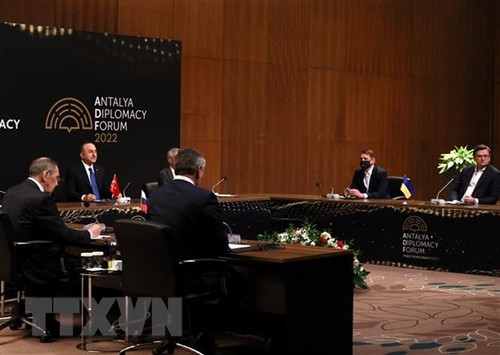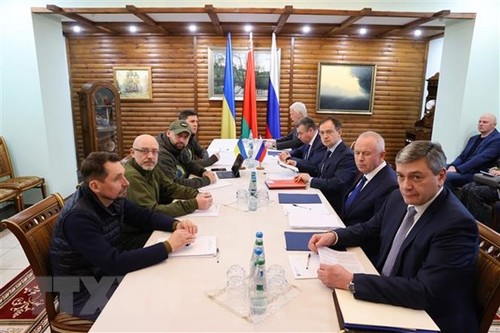 Russian Foreign Minister Sergei Lavrov (left), Ukraine's Foreign Minister Dmytro Kuleba (right) and Turkish Foreign Minister Mevlut Cavusoglu at talks in Antalya, Turkey, March 10, 2022. Photo: AFP/VNA Russian Foreign Minister Sergei Lavrov (left), Ukraine's Foreign Minister Dmytro Kuleba (right) and Turkish Foreign Minister Mevlut Cavusoglu at talks in Antalya, Turkey, March 10, 2022. Photo: AFP/VNA |
The first meeting between the two countries’ foreign ministers after Russia launched a “special military operation” in Ukraine on February 24 discussed a humanitarian corridor, a ceasefire, nuclear security, and Ukraine's neutral status, but failed to reach an agreement on anything except to continue with more meetings.
The focus of the third meeting, in Belarus, and also the top concern of the international community at the moment was the evacuation of civilians through humanitarian corridors. This issue has been at least partially resolved.
When Russia and Ukraine agreed to sit down at the negotiating table for the first time on February 28, the world welcomed the meeting but was not optimistic about the two sides quickly agreeing to a ceasefire.
Through three dialogues in Belarus, neither side has been willing to make concessions. Russia raised the issues of demilitarization and guarantees of Ukraine's neutrality, while Ukraine said it was prepared to agree on all issues "except for the status of Crimea and Donbass”, meaning Ukraine will not recognize those regions as independent.
 Representatives of the Russian and Ukrainian delegations at the third round of negotiations in Belovezhskaya Pushcha, Belarus, March 7, 2022. Photo: Xinhua/VNA Representatives of the Russian and Ukrainian delegations at the third round of negotiations in Belovezhskaya Pushcha, Belarus, March 7, 2022. Photo: Xinhua/VNA |
As combat casualties and the spiral of sanctions and counter-sanctions mount, urgent diplomacy continues.
France and Germany continue to be involved. During the two weeks of fighting, French President Emmanuel Macron has had four phone calls with President Putin, and German Chancellor Olaf Scholz has kept open a channel of communications with Russian leaders. Both Russia and Ukraine think Western powers need to maintain a dialogue with Russia to allay Moscow's security concerns, a root cause of the conflict.
Israel, Turkey, and Indonesia have expressed their desire to mediate between Moscow and Kiev. South Korean Foreign Minister Chung Eui-yong and his counterparts from Mexico, Indonesia, Turkey, and Australia (known as the MIKTA group) discussed online this week the situation in Ukraine and how peace might be restored.
The UN has held multiple meetings between heads of delegations, including the Russian and Ukrainian delegations, seeking a solution.
Mounting casualties are putting pressure on the diplomatic efforts. A ceasefire does not seem imminent, but the door to peace has not yet slammed shut.